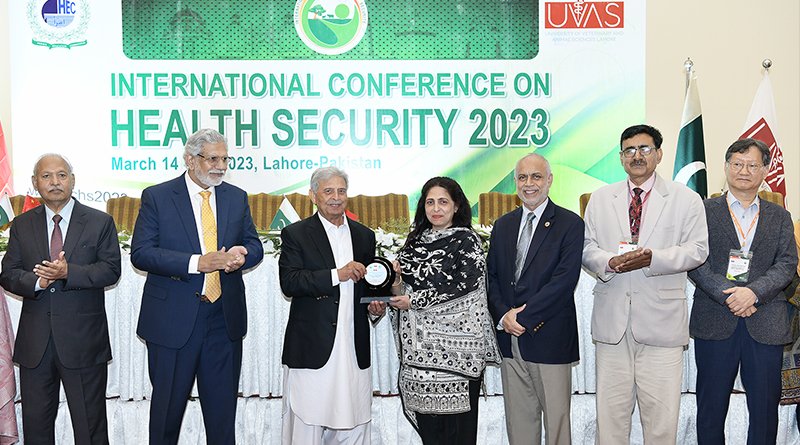The experts emphasised the urgent need for international cooperation among nations to address challenges in health security.

Promoting community involvement in health emergency preparedness and response through education, training, and participation in decision-making processes has been strongly advised by a two-day International Conference on Health Security (ICHS).
The conference’s closing ceremony was presided over by Pakistan’s Federal Minister for Education and Professional Training, Lt. Gen. (R) Muhammad Asghar, UVAS Vice Chancellor Prof. Dr. Nasim Ahmad (SI), Director General of CPEC (HEC), Dr. Safdar Ali Shah, and Principal KBCMA-CVAS Narowal.
Famous veterinary medical practitioners, academicians, researchers, and academicians from various nations, including Korea, China, Saudi Arabia, the United Arab Emirates, the USA, and all of Pakistan, participated physically and virtually in ICHS. The conference’s organising secretary was Prof. Dr. Younus Rana.
During the closing ceremony of International Conference on Health Security, the Minister addressed the audience and urged improving the dairy sector by utilising contemporary technologies to increase milk and meat production. Strong connections, according to him, are necessary to bridge the gap between consumer demand and research on product quality.
Such conferences, according to him, are essential for the growth of the livestock industry. In order to address the climate issue in Pakistan, he suggested that climate change be covered in the curriculum. For organising the conference, he praised UVAS.
Speaking at the event, Prof. Dr. Nasim Ahmad said that the Health Security (ICHS) programme under CPEC gave us the opportunity to collaborate with renowned universities in China to build our capacity in the areas of processing dairy and meat products and value addition.
He also discussed UVAS’s position and historical significance in Pakistan for the development of the livestock industry. Before that, Prof. Dr. Aneela Zameer Durrani gave the vote of thanks, and Prof. Dr. Joon-Seok Chae from the College of Veterinary Medicine at Seoul National University, Republic of Korea, gave the conference’s recommendation.
The conference, which was sponsored by the Department of Veterinary Medicine at the University of Veterinary Animal Sciences (UVAS) Lahore in conjunction with the Higher Education Commission (HEC) and the China Pakistan Economic Corridor (CPEC), also advocated for the promotion of cooperation and information-sharing among nations, governments, international organisations, civil society, and the private sector to foster a comprehensive and coordinated response to global health issues.
The experts emphasised the urgent need for international cooperation among nations to address challenges in health security through the sharing of knowledge, resources, and adaptation of best practises and to ensure equitable access to essential technologies, such as vaccines, diagnostics, and treatments, especially in low- and middle-income nations like Pakistan.
They also demanded that veterinary and healthcare systems be given the tools they need to provide top-notch medical care during outbreaks, floods, and other natural disasters. Because of the stress brought on by climate change, livestock production is declining, which is extremely concerning for the availability of food.
Zoonotic importance of different diseases must be emphasised, and human, veterinary, and environmental dealing components, as well as the general public, should be made aware. Instead of seeing it as the government’s sole responsibility, they continued, national health security plans should be viewed as a civic obligation.
The Constitutional Framework’s definition of national security needs to be revised and expanded to include emerging, reemerging, and other transboundary human and animal diseases as one of the main threats to the health and food security of the human population.
64 research papers were presented during the two-day conference, which featured 24 speakers from abroad and 60 speakers from within the country.